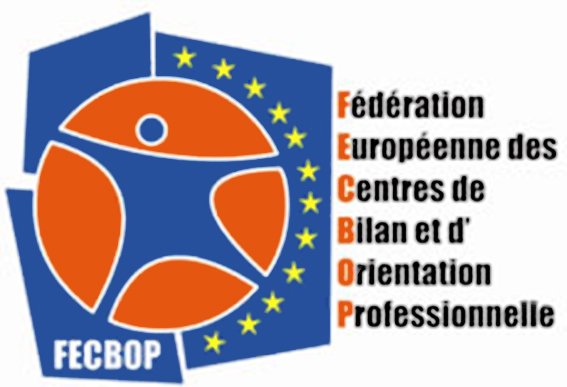Certifying body: FECBOP – Fédération Européenne des Centres de Bilan et d’Orientation Professionnelle / European Federation of Centres of Career Guidance and Bilan de Competences
The quality standard and labelling procedure were developed by the European network of career guidance providers influenced by the “bilan de compétences“ (skills audit) methodology.
Skills audit („bilan de compétences“) came into existence in France as a tool helping the organizations and employees to analyze their knowledge, skills, abilities, competences and motivations and prepare a realistic career goal and an action plan. First centres of the bilan de compétences were created in 1986. A national network of inter-institutional centres for the bilan de compétences (CIBC) was created in 1989.
Through different projects the methodology slowly spread to other countries (Italy, Belgium, Germany) and in 2004 a European association of providers was created. With the assistance of the French network of CIBCs the European Standard “Qualité Europe Bilan de Compétences” was created. Its goal is to maintain and protect a common quality level between providers and to differentiate the service from other similar services.
The label is delivered by the European Labelling Committee that is an elected body within FECBOP with 5 members (currently 1 from France, 2 from Italy, 1 from Belgium, 1 from Czech republic).
The quality assurance process is as follows:
- The organization sends the candidature sheet to the FECBOP Executive Bureau of the Federation. This sheet contains basic information about the candidate (activities, statistical data, motivation for obtaining the label).
- The Executive Bureau assigns the auditor: 3 auditors are currently working for FECBOP, trained by the French network of skills audit centres. The auditor sends the candidate the necessary documents (Audit agreement, Guide for internal audit and requirements for the agenda of the audit visit. Internal audit guide allows the organization to prepare for the audit visit and collect all necessary evidence and send it beforehand to the auditor.
- The auditor agrees with the candidate organization on the time schedule (date of the visit, deadline for submission of internal audit guide, foreseen date of the meeting of the meeting of European Labelling Committee (1-3 months after the audit)
- The audit takes 2 days and contains meeting with an official representative, consultation of documents (final reports from bilan de competences, competence portfolios), consultation of the library of methods, meeting with a group of beneficiaries and with a group of counsellors.
- The auditor prepares the audit report within 15 days after the audit. Draft of the audit report is sent to candidate for eventual comments and corrections (if necessary) and then submitted to the European Labelling Committee.
- The European Labelling Committee meets and decides about awarding the quality label (usually 1-3 months after the audit). The auditor presents the report and additional questions can be asked by the committee members to the candidate during the meeting.
Currently, 25 centres in 8 countries successfully obtained the quality label and 5 – 7 audits are realized every year by FECBOP auditors. The audit is realized every 5 years.
FECBOP quality standard is available here. The standard is used mainly in countries with links to French culture (Italy, Belgium) or in countries, where it was spread through projects (Slovakia, Czechia, other CEE countries). In almost all cases it occupies the vacuum caused by the lacking national system of QA in CG. The standard is not mandatory (except for France and some specific cases). Its recognition is highly dependant on the country.
What are the most challenging aspects of the quality standard to implement?
Analysis realized during the QUAL-IM-G project (interviews with FECBOP auditors) revealed, that the following aspects are deemed as the most difficult to implement by skills audit providers:
Methodological issues (NB: these issues are in some cases specific to the methodological nature of the skills audit as used within the FECBOP network of providers):
- Multidisciplinary character of the provided service: the quality standard requires the centre to have a multidisciplinary team of providers, whereas many centres tend to employ counsellors with specific backgrounds (e.g. psychologists) which results in a rather homogenous staff of counsellors (from the point of view of their qualification). This is then often reflected in the methodology that is used predominantly in the guidance work done by the centre (e.g. too much focus on psychological assessment).
- Insufficient focus or on labour market exploration: similar and often connected to previous point: some providers tend to focus on analysis of personal characteristics of the beneficiary (interests, personality…) and do not connect this information sufficiently with the socio-economic context of the beneficiary. The career goals that result from the skills audit can then be too broad or disconnected from the global situation of the beneficiary.
- Effective implementation of the portfolio or other documentation approaches: Identification and documentation of the competences of the beneficiary are often approached superficially – often because the providers do not completely understand and see the added value of it.
- Development of career management skills and active role of the beneficiary: Some centres tend to focus on expert analysis of client’s interests, personality traits and acquired skills and knowledge. This is especially the case if they work with the low skilled with the objective of matching them to appropriate job (if the PES are financing the service). Providers rarely use explicit pedagogical framework (CMS framework, identification of needs of the beneficiary in term of CMS development, individual or group activities with defined learning objectives).
- Common glossary and internal methodological guide: lack of common understanding of different terms (knowledge, skills, competence, interest, career management skills…). Non-existence of common methodological guide, that would formalize the process and could be used by newly employed counsellors.
Organizational issues:
- Evaluation, training and development of staff: non-existent procedure for the identification of training needs, elaboration of training plan. This area is often reduced to informal internal meetings for sharing of experiences, without tangible results or capitalization of these exchanges.
- Satisfaction and impact evaluation: insufficient of inexistent system for monitoring satisfaction of the beneficiaries or impact of the provided service (3-6 months after the service).
- Continuous quality improvement: Providers rarely implement mechanisms for monitoring quality of the service and collecting feedback (e.g. statistical treatment of satisfaction questionnaires) to improve their service.
- Research and development: This activity is often neglected by the providers, mainly in cases where the guidance activity is new, project-based or occasional (dependent on public tenders…).
- General formalization of procedures: small centres seem to rely on informal processes and/or oral “tradition” in their practices. Guidance centres often don’t like procedures and are not accustomed to process management and quality assurance practice.
Policy-related issues:
- Voluntary participation of beneficiaries: in some countries skills audit is used as and ALMP measure and the beneficiary can face sanctions if he refuses the offer from the labour office to participate.
- Financial sustainability of the service: Guidance activity is often project-based or occasional (dependent on public tenders…).
- Networking, linking to other services: in some countries (especially in central and eastern Europe) the network of potential services in the field of lifelong learning, lifelong guidance or social support is weak or inexistent, given the lack of public funding.
- Link to systems of validation of non-formal and informal learning: in some countries these systems are insufficiently developed or inexistent.


